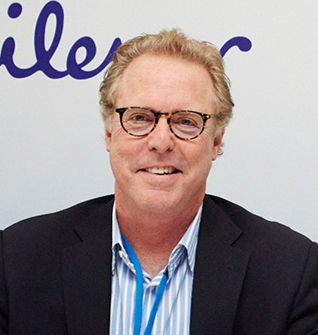Jeff Seabright

Jeff Seabright ’73 wants to elevate the international conversation about sustainability. Now.
Seabright, chief sustainability officer for global consumer goods giant Unilever, is spreading a message of urgency, as well as opportunity. “If the world continues on a ‘business as usual’ trajectory, then we lock in climate change we can’t adapt to,” he says. “So the question is: Are we smart enough to get on top of this?”
Seabright says “yes.” Unilever, whose 400 brands include Lifebuoy soap, Lipton tea and Ben & Jerry’s ice cream, recently pledged to reduce its environmental impact while increasing long-term profits. In 2010, the company launched its Sustainable Living Plan, committing to zero deforestation in its supply chain. A large part of Seabright’s job is convincing other corporate and government leaders to join Unilever’s effort. In 2010, while at Coca-Cola, he helped garner a pledge from members of the Consumer Goods Forum, an industry trade group, to eliminate deforestation associated with commodities such as palm oil, soy, paper/pulp and beef by 2020. As the single largest buyer of palm oil in the world, Unilever can help drive systemic change in the industry. At January’s World Economic Forum in Switzerland, Seabright and Unilever CEO Paul Polman noted that over 90 percent of globally-traded palm oil is committed to being sustainably sourced, which Seabright believes is a “significant down payment” on climate control.
“Virtually every company has an energy efficiency program but that’s not sufficient,” he says. “Businesses have a unique opportunity to change the way people use energy and be forces for positive change.”
Before joining Unilever in 2014, Seabright championed water stewardship and energy management as vice president of environment and water resources at Coca-Cola in Atlanta, establishing environmental initiatives with organizations such as the World Wildlife Fund, the U.S. Agency for International Development (USAID) and CARE. He also played a role in developing Coke’s PlantBottle, a fully recyclable PET bottle that’s partially made of plant materials.
Sustainability wasn’t Seabright’s original passion. Early in his career, he worked for the U.S. government, focusing on issues related to the Cold War. (“I wanted to end the nuclear arms race,” he jokes.) Seabright enjoys seeking answers to big questions. The West Virginia native sought a high level of educational engagement when he arrived as a prep at Exeter. His love of writing and analytical thinking (which he credits to the Harkness method) inspired him to pursue a bachelor’s degree in philosophy at Oberlin College in Ohio and later a master’s degree in international relations from The London School of Economics. A burgeoning interest in politics led to an internship with the Foreign Affairs Division of the Congressional Service, in Washington, D.C., researching the SALT treaty for the Senate Foreign Relations Committee.
He continued his government work in the State Department as a foreign service officer in Brussels with NATO and later was a legislative assistant to Senator John D. Rockefeller IV ’54 of West Virginia, then Senator Timothy Wirth ’57 of Colorado. “It was at the end of the Cold War, and Senator Wirth spoke about redefining U.S. national security to include human progress, women’s empowerment and climate change,” Seabright says. “That inspired me to become involved in the environmental sector.”
Seabright served as director of the Office of Energy, Environment and Technology at USAID; was later appointed executive director of the Climate Change Task Force by President Bill Clinton; and participated in negotiations for the Kyoto Protocol, an international agreement among participating countries to reduce greenhouse gas emissions. Seabright transitioned into the corporate sector as an executive for Texaco, then became an environmental consultant to corporations and to the United Nations. “I could make more of an impact on climate change from the business side than the government side,” he says.
His next opportunity is mobilizing businesses and consumers to be “game changers” for climate change, especially during the United Nations Climate Change Conference this November in Paris. “We can use our ingenuity to get to a low-carbon future,” he says. “We need more political will and leadership to make it happen. That’s why it’s important for business leaders to drive real change and create space for greater political ambition.”
By Debbie Kane